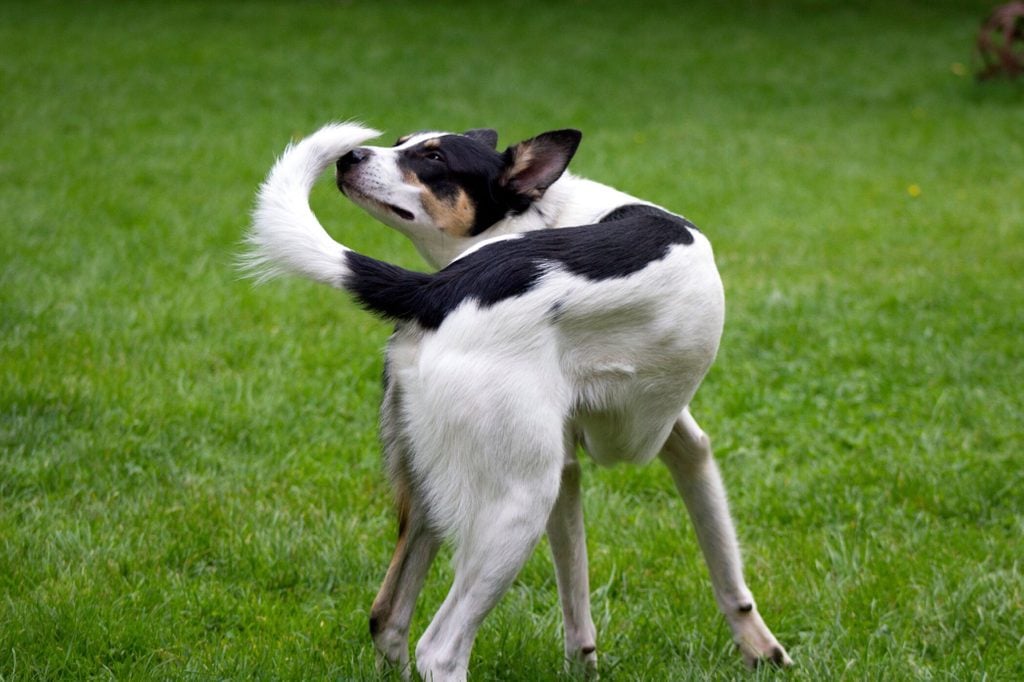Puppies are undoubtedly adorable creatures that bring joy and happiness into our lives. However, as pet owners, we may sometimes notice peculiar behaviors in our furry friends that leave us puzzled and concerned. One such behavior is when a puppy starts biting its own tail. This seemingly innocent act can raise questions and leave us wondering about the reasons behind why does my puppy bite his tail?
 Tail biting in puppies can be attributed to various factors, including physical, behavioral, and psychological aspects. Understanding these underlying causes is crucial in addressing the issue effectively and ensuring the well-being of our beloved pets.
Tail biting in puppies can be attributed to various factors, including physical, behavioral, and psychological aspects. Understanding these underlying causes is crucial in addressing the issue effectively and ensuring the well-being of our beloved pets.
Understanding the Reasons Behind Why Does My Puppy Bite His Tail
Puppies are known for their playful and curious nature, but when they start biting their own tails, it can be a cause for concern. To address this behavior effectively, it is crucial to understand the underlying reasons behind why does my puppy bite his tail. Let’s explore some of the key factors that contribute to this behavior:
1. Discomfort or Itchiness
One of the primary reasons why does my puppy bite his tail is discomfort or itchiness. Just like humans, dogs can experience allergies, skin irritations, or flea infestations, which can cause intense itching in their tails. Unable to reach the source of irritation, puppies resort to biting their tails as a way to alleviate the discomfort. It is important to examine your puppy’s tail for any signs of redness, swelling, or wounds, as these may indicate underlying health issues that require veterinary attention.
2. Teething and Exploration
Puppies, especially during their teething phase, have a natural instinct to explore and chew on objects. Their tails, being easily accessible and within their reach, may become targets of their curiosity and desire to chew. Similar to how puppies chew on toys or household items to soothe their gums during teething, they may view their tails as an option for relief. Providing appropriate chew toys and redirecting their attention to these toys can help deter them from tail biting.
3. Behavioral and Psychological Factors
Tail biting can also be attributed to behavioral and psychological factors. Puppies, like humans, can experience anxiety, stress, or boredom. Tail biting may serve as a self-soothing mechanism for puppies experiencing these emotions. It provides them with a temporary distraction from their distress and helps release pent-up energy or frustration. Identifying potential triggers or stressors in your puppy’s environment and implementing strategies to reduce anxiety or boredom can help alleviate why does my puppy bite his tail.
4. Lack of Exercise and Mental Stimulation
Insufficient exercise and mental stimulation can contribute to tail biting in puppies. If a puppy does not receive adequate physical exercise and mental enrichment, they may resort to tail biting as a way to release excess energy or boredom. Ensuring regular exercise routines, engaging in interactive play sessions, and providing puzzle toys or treat-dispensing toys can help keep your puppy mentally and physically stimulated, reducing the likelihood of tail biting.
Practical Recommendations to Address Why Does My Puppy Bite His Tail
Tail biting in puppies can be a concerning behavior, but there are several practical steps you can take to address and prevent this issue. By implementing these recommendations for, you can help your puppy overcome tail biting and create a safe and comfortable environment for them to thrive in.
1. Consult with a Veterinarian
If your puppy is persistently biting their tail, it is essential to consult with a veterinarian. They can examine your puppy’s tail for any signs of irritation, injury, or underlying health issues that may be causing the behavior. A veterinarian can provide appropriate treatment and guidance based on your puppy’s specific needs.
2. Address Any Physical Discomfort or Itchiness
If discomfort or itchiness is the underlying cause of tail biting, it is crucial to address the issue directly. Regularly inspect your puppy’s tail for any signs of allergies, skin irritations, or flea infestations. Treat these conditions promptly with the guidance of a veterinarian to alleviate the discomfort and reduce the urge to bite their tail.
3. Provide Appropriate Chew Toys
To redirect your puppy’s chewing behavior away from their tail, provide them with a variety of appropriate chew toys. Opt for toys specifically designed for teething puppies, such as rubber or nylon chew toys. These toys can help soothe their gums and satisfy their natural chewing instincts. Ensure the toys are safe, durable, and suitable for your puppy’s size and breed.
4. Enrich Your Puppy’s Environment
To prevent boredom and reduce stress, it is important to enrich your puppy’s environment. Engage in interactive play sessions, provide puzzle toys or treat-dispensing toys that require mental stimulation, and rotate their toys regularly to keep them engaged. Consider introducing new experiences, such as supervised outdoor exploration or playdates with other friendly dogs, to provide additional mental and social stimulation.
5. Establish a Regular Exercise Routine
Regular exercise is crucial for a puppy’s physical and mental well-being. Establish a consistent exercise routine that includes daily walks, playtime, and opportunities for your puppy to run and explore safely. Tailor the exercise routine to your puppy’s age, breed, and energy level. A tired puppy is less likely to engage in destructive behaviors like tail biting.
6. Practice Positive Reinforcement Training
Positive reinforcement training can help redirect your puppy’s behavior and reinforce desired actions. Reward your puppy with treats, praise, and affection when they engage in appropriate behaviors and refrain from tail biting. Consistency and patience are key when training your puppy, so be sure to provide clear and consistent cues and rewards.
7. Create a Safe and Stress-Free Environment
Ensure that your puppy’s environment is safe and free from potential stressors. Provide a comfortable and cozy resting area, away from noise and distractions. Minimize exposure to stressful situations or stimuli that may trigger tail biting. Consider using calming aids, such as pheromone diffusers or calming music, to create a soothing atmosphere for your puppy.
 Remember, each puppy is unique, and it may take time and patience to address tail biting behavior effectively. If the behavior persists or worsens despite your efforts, consult with a professional dog trainer or animal behaviorist for further guidance. With love, care, and consistent implementation of these recommendations, you can help your puppy overcome tail biting and ensure their overall well-being.
Remember, each puppy is unique, and it may take time and patience to address tail biting behavior effectively. If the behavior persists or worsens despite your efforts, consult with a professional dog trainer or animal behaviorist for further guidance. With love, care, and consistent implementation of these recommendations, you can help your puppy overcome tail biting and ensure their overall well-being.
Why Does My Puppy Bite His Tail – Conclusions
Tail biting in puppies can be a concerning behavior, but by understanding the reasons behind why does my puppy bite his tail, we can take appropriate measures to address the issue. Discomfort or itchiness, teething and exploration, behavioral and psychological factors, and lack of exercise or mental stimulation are all potential factors contributing to tail biting. It is essential to observe and assess your puppy’s tail for any signs of irritation or injury and consult with a veterinarian if necessary. Additionally, providing appropriate chew toys, addressing underlying stressors, and ensuring sufficient exercise and mental stimulation can help deter tail biting behavior. With patience, attention, and proper care, we can help our puppies overcome this behavior and ensure their overall well-being.






















